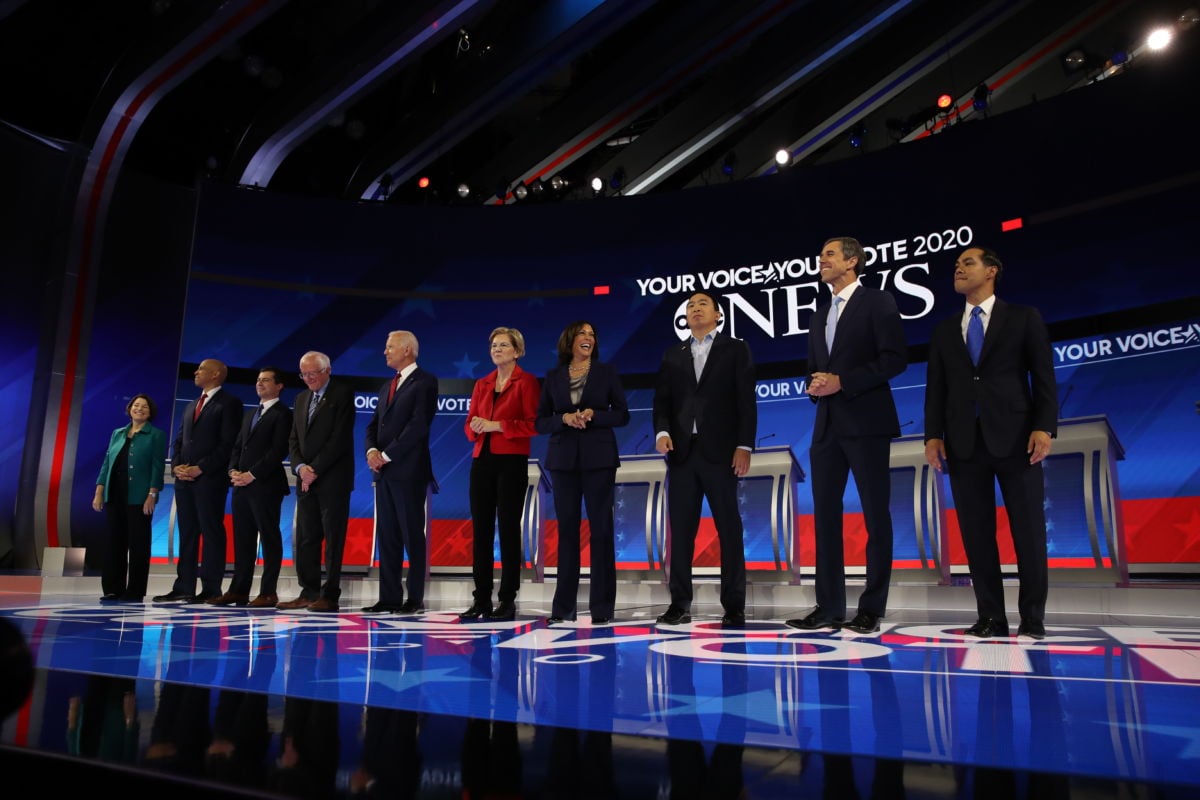In a break from tradition and a blow to transparency, presidential candidates are still not revealing information about the well-connected donors helping them raise campaign cash.
Federal candidates are not required to disclose information about bundlers — elite fundraisers who solicit contributions to a candidate from wealthy friends, business associates and other contacts — unless the bundler is a federal lobbyist. However, previous presidential candidates such as George W. Bush, John McCain, Barack Obama and Hillary Clinton voluntarily disclosed at least some information about their bundlers.
As with his 2016 campaign, President Donald Trump is hiding the fundraisers who are powering his 2020 reelection bid. And many of Trump’s Democratic opponents appear to be following his lead.
None of the 2020 Democrats have released comprehensive information about their big-dollar fundraisers. South Bend, Ind., Mayor Pete Buttigieg and Sen. Kamala Harris (D-Calif.) are the only candidates to disclose a list of bundlers. Neither list includes information about how much money each bundler raised. While Buttigieg’s list has not been updated since April, Harris’ list of those who raised more than $25,000 is updated every quarter, according to the campaign.
A coalition of 16 pro-transparency organizations, including the Center for Responsive Politics, sent a letter Wednesday to 23 major Democratic and Republican presidential candidates urging them to disclose their big-money campaign bundlers.
“Implementing a robust bundler disclosure system that publicly displays information about all individuals who raise $50,000 or more for your campaign would help demonstrate your commitment to transparency as you seek your party’s presidential nomination,” states the letter, authored by campaign finance reform organization Issue One.
Several candidates, including Tim Ryan and Andrew Yang, have said they would disclose information about bundlers but said they don’t have any. Top contenders Elizabeth Warren and Bernie Sanders, who both reject big-dollar fundraisers, have said they do not have “official” bundler programs. Trump and Joe Biden are among the candidates who have not responded to requests for comment on the subject.
Trump rolled out a bundler program in May and has since amassed record breaking fundraising for both his campaign and the Republican National Committee. Biden’s bundlers may not be providing as much cash, but the former vice president is the most dependent on big-money fundraisers of the top 2020 Democrats.
A donor can only give $5,600 to a presidential campaign, but they are free to ask their associates and friends to contribute in order to curry favor with their preferred candidate. These efforts often pay off, as presidents of both parties typically give sought-after positions in government to top bundlers or donors to the campaign.
Michael Beckel, director of research, investigations and policy analysis at Issue One, said in an email that bundlers often ensure they get credit for raising large sums of money for a campaign. As such, donors are sometimes asked to write a specific code in the memo line of a check so the bundler gets credit, he said.
“It’s plausible that a lower tier presidential candidate might not have a system in place to track the precise amounts of money by bundlers, but it’s inconceivable that a major presidential candidate with a bundler program would not be tracking how much money their top fundraisers had raised,” Beckel said.
Among those candidates who did disclose their bundlers in past races, the quality of information varied.
In 2012, the New York Times obtained a detailed list of bundlers to Obama’s campaign, including how much they raised for Obama since 2007. Obama’s actual disclosures only revealed how much his bundlers raised in wide ranges, as did McCain’s. In 2012, Obama used the same method while his opponent Mitt Romney didn’t disclose his bundlers.
In 2016, Clinton released a list of individuals who raised more than $100,000 for her campaign but didn’t specify how much they raised beyond that. Her opponent, Trump, didn’t disclose his bundlers.
The pro-transparency letter asks that candidates disclose the exact amount of money each bundler raised for the campaign. It also requests that campaigns upload bundler information in tandem with Federal Election Commission deadlines and in a format that is accessible and searchable.
These organizations previously sent similar letters in April and June but heard back from only a handful of campaigns.
Press freedom is under attack
As Trump cracks down on political speech, independent media is increasingly necessary.
Truthout produces reporting you won’t see in the mainstream: journalism from the frontlines of global conflict, interviews with grassroots movement leaders, high-quality legal analysis and more.
Our work is possible thanks to reader support. Help Truthout catalyze change and social justice — make a tax-deductible monthly or one-time donation today.
